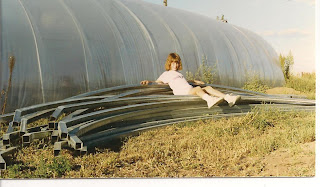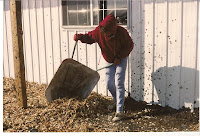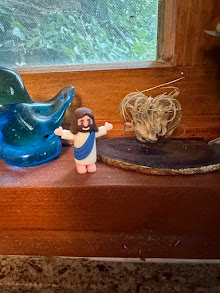There is a magic moment in a child's life when he knows he is no longer a baby and believes he is equal in many respects to mommy and daddy. ( This belief is apparent during daylight hours, but disappears inconveniently after 10 o'clock at night.) Kids don't mind making their beds, will put their dishes in the sink, might attempt to put their clothes away, and even go through the motions of picking up toys. I can remember this stage, because my vision of a clean room was so diametrically opposed to that of my father. Unfortunately, this stage doesn't last. All parents know there is an inverse relationship between a child's age and his willingness to be a useful contributor to the household and society past some critical point, probably not long after first grade. Not surprisingly, this may also coincide with the Biblical age of accountability
(Cursed is the ground because of you; through painful toil you will eat of it all the days of your life. Genesis 3:17). Toil is one of those words that sounds ugly, invoking sludge, mud, repetition , brain numbing, Sisyphean and even pointless labor. It contrasts, at least to me, with the word 'work', which implies movement to a goal, an accomplishment, something of value and worth. The good news is that most children do not recognize the nuanced differences between the words, 'toil' and 'work'. The bad news is that, the older they get, they most certainly realize that 'toil' is not only hard, but also the only kind of work they are given.
 This long muse is a result of powers way above the level of parental intervention. The United States government wishes to take the burden of taskmaster off the shoulders of moms, dads, grandmas and grandpas as far as farm work is concerned. No more of that nasty toil, dirt, grime, heat, cold, and other character building adjectives. Nothing should be too hard for 'the children'.
This long muse is a result of powers way above the level of parental intervention. The United States government wishes to take the burden of taskmaster off the shoulders of moms, dads, grandmas and grandpas as far as farm work is concerned. No more of that nasty toil, dirt, grime, heat, cold, and other character building adjectives. Nothing should be too hard for 'the children'. I could regale you with tales from my childhood. My father was in charge of hard, hard work and my sister and I kept our feelings to ourselves whenever he called us out and assigned us our chores. I learned to complete a task and maintain a stoic, if not cheerful, expression at the same age I learned the meaning of the word. Even while working on our own, we assumed our parents were omniscient, omnipresent, and omnipotent, just like the Trinity, as far as work was concerned. Unlike cleaning our room, we took our farm work quite seriously. I do not remember ever attempting to 'slide by' on any assignment my parents gave me, though their memories may differ.
I could regale you with tales from my childhood. My father was in charge of hard, hard work and my sister and I kept our feelings to ourselves whenever he called us out and assigned us our chores. I learned to complete a task and maintain a stoic, if not cheerful, expression at the same age I learned the meaning of the word. Even while working on our own, we assumed our parents were omniscient, omnipresent, and omnipotent, just like the Trinity, as far as work was concerned. Unlike cleaning our room, we took our farm work quite seriously. I do not remember ever attempting to 'slide by' on any assignment my parents gave me, though their memories may differ. In many cases, working FOR our parents meant working WITH our parents. That's how Blake grew up and that has been the experience for all three of our children. It is difficult to feel picked on or punished when working alongside your father, grandfather, mother or grandmother. Our greenhouse business has been the incubator for more than one work ethic. When we first began building, there would be a kid on one end of the string making the straight line for posts. There would be a kid fetching tools. Or a kid holding the ladder. Early on, covering a greenhouse was a family affair....even the youngest was heavy enough to sit on a corner of plastic and keep the wind from getting underneath. Everyone took turns filling pots with potting mix; everyone was expected to help carry pots and flats. The cardinal rule was: no bathroom break, no coffee break, no lunch break, until your plants or seeds are watered in. Not all work is life or death, but some is.

When kids work, its not just about productivity or the bottom line. One of Grandpa H.'s favorite aphorisms still holds true:'A boy is a boy; two boys is half a boy, and three boys is no boy at all!' No, kids work for a host of reasons, very few pecuniary. Moms and dads "take a kid to work" to keep them out of trouble; to teach by example; and, to spend time together. The hardworking dad at our place confessed more than once that he recruited his kids' help because he liked the company, not just because they were "good help".
On weekend mornings in the spring, its hard to keep track of all the kids at the greenhouse. Aaron is old enough now to be commandeered by his daddy to help feed pots or trays into the dirt machine, or help at the transplanter, He's eight; he's spent parts of every spring of his life in these structures, crawling through the potting mix, untagging tagged flats, watering constructively and destructively moment to moment. When his kindergarten class came to visit, Aaron was the proud in-house expert. I am proud of his knowledge and of his parents for starting him out right. The younger kids will be almost five: too young to really work, but they will still push buttons on and off, help tag sporadically, push carts along the sidewalk, and plant the occasional flat of petunias or impatiens. What they will mostly do, and quite responsibly, is take care of themselves and each other. They'll amuse themselves, secure in the knowledge that they are on home turf and mom, dad, uncle, aunt, cousins, and grandparents are all within shouting distance.
A farm, or a greenhouse, admittedly, can be a dangerous place. So is the rest of the world. But whatever rules and regs are imposed upon small businesses and family farms will not make them safer than the schools, playgrounds, shopping centers and parking lots kids frequent. All work and no play may make Jack a dull boy, the nursery rhyme says, but the lesson our kids learned early and often was to never let on, or speak the fateful words: 'I'm bored!' Working with adults builds ties that bind closer than gifts or treats. The kids "own" their accomplishments; they know what Dad and Mom do for a living, and have a sense of how difficult it can be. If you spend your weekend holding sheetrock on your head, or straddling the metal framework of the endwall of a greenhouse 16' feet in the air, or watering the same 3000' sq.ft. of tomatoes that you watered the day before, you truly appreciate Sunday afternoon off. And you will also know, for a fact, that you have accomplished something tangible. These are lessons taught by life, by moms and dads who seem heartless and tone deaf, to kids who will suffer these torments, silently or no. These same tales of hard work and "hardship" will pass into family legend, to be resurrected for the edification and example of the next generation of kids drug away from the cartoons to hold the tape measure or fetch the socket set.

'What's bred in the bone...'
























No comments:
Post a Comment